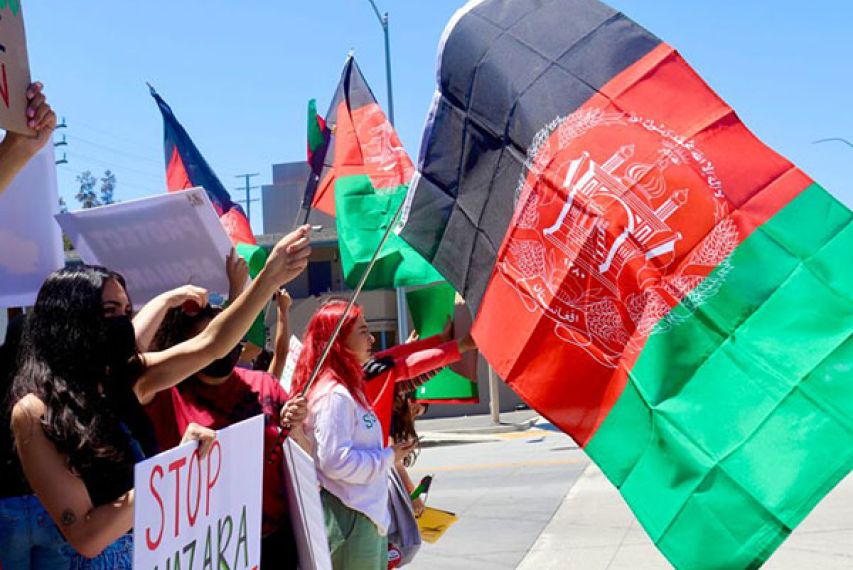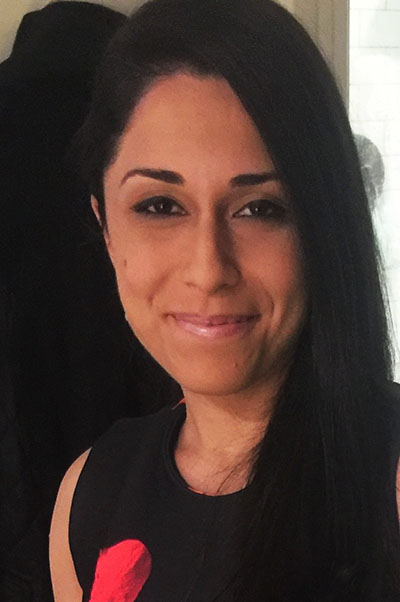Helena Zeweri joined University of Virginia as a Global Studies assistant professor in 2020. She currently offers courses on global migration, immigrant-led political activism, and humanitarianism. She spoke to UVA Global about her family’s journey from Afghanistan and how it continues to influence her research.
Tell us about your family’s journey from Afghanistan to the United States.
Zeweri: I was born about five years after my parents left Kabul, Afghanistan. My parents and extended family members came to the US in the late 1970s following the Soviet Union’s takeover of the Afghan government, which preceded the beginning of the Afghan-Soviet War which lasted from 1979 to 1989.
Their arrival to the US was the result of multiple kinds of privileges they had that so many others did not. My mother’s family was in the US (because her father worked for airport management at Kabul) when they received the news of the coup d’etat in which Daoud Khan was overthrown, which marked the solidification of the Soviet Union’s role in the Afghan government. They decided to not return following the news.
My father’s side of the family also found themselves stuck in Germany after the Soviet Union’s invasion of Afghanistan in 1979. They ended up never returning and sought asylum in the US. So, their experiences of displacement were marked by the realization that they would never be able to return home again and never see their family, friends, and loved ones.
You also teach and research global migration. How does your work intersect with your personal life? Did it have any impact on what you study?
Zeweri: Yes, absolutely. My research focuses on the experience of displacement and finding community among migrants from Afghanistan and other contexts of prolonged conflict since the 2001 War on Terror.
A key part of my research examines how migrants resist the conditions that both displace them and immobilize them and their aspirations (i.e. border control policies, detention centres, and racialized social welfare). Part of what drives this interest is my own experience witnessing how first generation Afghan migrants have been treated as social problems and threats to the nation-state, and how even when they are ‘rescued’ they are treated as objects of pity, rather than as multi-faceted human beings who can meaningfully participate in the civil society and political life of their new communities.
Last semester I taught a course called Migrant Women’s Political Activism across Geographies. A key premise of the class was that migrants are not defined by the circumstances of desperation in which they may find themselves. Rather, both before and after their journeys, they are real people who are invested in making their ancestral and new communities more equitable and empowered spaces. Our class collaborated to create what I hope will be a running digital archive of migrant stories and modes of empowerment (www.beyondrefuge.net).
How would you describe the current crisis in Afghanistan?
Zeweri: The current crisis in Afghanistan is hard to explain in a few sentences, but it is, generally speaking, the result of a confluence of multiple institutions, historical events, state actors, and geopolitical agendas. The re-emergence of the Taliban is in part the result of the US withdrawing after years of shaping puppet governments that were never really committed to the removal of the Taliban as a political force in the country.
The Taliban had still been an active political and insurgent force after 2001. Prof. Ali A. Olomi, a historian of Afghanistan, has recently written a powerful op-ed that traces the history of corruption in Afghanistan (which the Taliban is one example of) all the way back to the British occupation of Afghanistan in the late 19th century. It continued with the Afghan governments therein and was reinforced by the Soviets and the US-a system of bribing warlords to ensure a balance of power and peace, while ignoring the long-term ramifications of such a fragile system.
You mentioned that you still have family in Afghanistan, tell us more about how they are doing?
Zeweri: I, along with thousands of other Afghans in the diaspora are grieving the futures that await our family members. The collectives we are a part of have been working tirelessly to get our family, loved ones, and ordinary people who have approached us for help, evacuated with little to no success.
We are doing the work that we thought the US government would be doing – that is trying to get people’s visa applications pushed through the pipelines at the Department of State, or begging contacts of congressional offices to write letters in support of our family members to be evacuated or granted visas immediately. We are doing the work of lawyers, filling out humanitarian parole forms and petitions for people to come to the country, and paying for these forms to be filed on top of that.
And yet, despite this, very few of us have found success in getting our loved ones out. We try to send them spurts of hope every day, whether it’s saying we’ve filled out another form, put them on the 20th evacuation or manifest list, all while knowing that there’s a slim chance anything will stick. Our loved ones feel disillusioned, increasingly hopeless, and some have just resigned to a future now in the hands of a regime that believes in systematic torture and violence against dissenters, minorities, and women.
We worry every time we exchange a voice note on whatsapp that it may be the last time we get to hear that person’s voice. It has been surreal to witness what dehumanization feels, sounds, and looks like in real time.
However, I have been inspired by the many protests against the Taliban taking place throughout Herat, Kabul, and Ghazni over the past few days. The Afghan people are actively fighting for their right to self-determination.
How is the diaspora working to support/help in this crisis?
Zeweri: It’s important that we avoid viewing this crisis as something that is happening ‘over there’, and that has nothing to do with other struggles for equality. The amount of information that diasporic coalitions have put together during this time has been remarkable. Our organization, the Afghan American Artists and Writers Association (aaawa.net and @aaawa_art), has been trying to put people in touch with initiatives and NGOs that are organizing evacuations.
It’s important not to fall into the same dehumanizing tropes that have defined previous humanitarian efforts in Afghanistan (i.e. in 2001), that have painted Afghans as savage barbarians who are in need of being ‘tamed’ just as much as they are in need of being ‘saved.’ The Afghan people and the diaspora do not support this repressive regime and have been fighting for equality and inclusivity for hundreds of years, despite the fact that this does not get media coverage. The diaspora is also politically mobilizing at a scale I have never seen before. There have been national protests for the past two weeks, and I don’t think they will slow down.
For those who want to learn more about how they can contribute, philanthropically or advocacy wise, there are a list of organizations you can follow on social media who are consistently posting action items on their accounts and who are made up of incredibly talented, committed, and intelligent people actively pursuing justice for their communities back home. These include the Afghan Diaspora for Equality and Progress, the Afghan American Coalition, and Afghans for a Better Tomorrow.
How can higher education institutions help in this crisis?
Zeweri: I think higher education has an important role to play in creating spaces where the situation in Afghanistan can be put in conversation with other interdisciplinary conversations in the academy on global human rights, participatory politics, and social justice. Oftentimes, Afghanistan gets siloed into its own anomalous category, which is a direct legacy of how Afghanistan has been historically studied and thought about by colonial administrators and academics as well as by some policymakers in the present.
Higher education may have a role to play in helping to offer refuge for scholars at risk who will be arriving in the US and giving them a space to develop their research which many have been forced to dispose of upon leaving their country. There is fear that so many archival projects among historians are being destroyed, and that research projects are getting erased.
If there was ever a time to amplify the voices of displaced Afghan scholars who know the experience of repressive regimes firsthand, it is now. There are many prolific academics who have fled Kabul and I think being able to continue their work while also being afforded visas and proper documentation, is key to the broader university effort to amplify voices from the global South.
(Main Image Photo Credit: Recent protests led by the Afghan diaspora in Los Angeles, courtesy of Malahat Zhobin)





